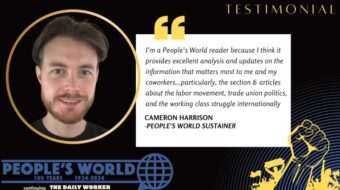WASHINGTON — The Asian Pacific American Labor Alliance, an AFL-CIO affiliate, brought hundreds of trade unionists here July 19-22 to celebrate their struggles and to chart a path for further advances and victory for working families in the 2008 elections.
The theme of APALA’s 9th biennial convention was “Living the Legacy,” saluting the centuries-long struggle of Asian American and Pacific Islander workers against racist oppression and super-exploitation.
A second theme was implementing Resolution No. 2, adopted at the AFL-CIO’s 2005 convention, to improve racial and gender diversity in the federation’s leadership.
APALA President Maria Somma told the delegates the group has tripled in membership since it was founded 15 years ago. There are now more Asian Pacific American union organizers, she said, “due in large part to our partnership with the AFL-CIO Organizing Institute.” Participants included delegates from Change to Win unions along with AFL-CIO members.
Like the rest of organized labor, Somma continued, APALA “has seen the decline in union membership, stagnant wages, disappearing pensions, massive job losses and eroding health care benefits. Unrestricted free market policies are wreaking havoc on workers and benefiting only corporate executives and the wealthy.”
In a plenary on political action, Christine Chen, executive director of Asian Pacific Islander Vote, said Asian and Pacific Islander voter clout is increasing. In Washington state, Democrat Christine Gregoire won the race for governor by only 146 votes last November. Asian American and Pacific Islander votes were her victory margin, Chen said.
In Virginia, Sen. George Allen’s use of a racist slur galvanized Asian American voters, who voted 76 percent for Democratic victor Jim Webb.
Yet the Asian American vote still lags, Chen said. “We need to educate voters not only to get out and vote but to insist that candidates support our interests and our values.”
Glenn Magpantay of the Asian American Legal Defense and Education Fund said Asian American voters in 2006 “faced discrimination, racial profiling and harassment” similar to Republican vote suppression tactics in 2000. Even so, “Asian Americans voted for change just as voters in general voted for change,” he said.
Asian Americans have supported “legalization of undocumented immigrants and reducing immigration backlogs while they opposed making undocumented a crime,” Magpantay said.
Karen Ackerman, AFL-CIO political action director, called the 2008 elections an opportunity “to shift the obscene imbalance of power going to the corporations while workers are losing out.”
Yet, “the Democrats have not made the sale. This is not going to be a slam-dunk,” she said.
Ackerman pointed out that in 1993, when the House, Senate and White House were all in Democratic hands, the passage of NAFTA produced devastating consequences for American workers.
The “strategic goal” for workers, she said, is a political realignment “to establish a long-term progressive, pro-worker, pro-union political environment in this country.”
Tony Sarmiento, APALA executive board member, chaired a “Town Hall Meeting” featuring panelists from other AFL-CIO constituency groups.
A. Philip Randolph Institute President Richard Womack addressed the need for more action to have labor’s leadership reflect the diversity the membership. “We must go back to our local unions and ask: ‘What are you doing to implement Resolution No. 2?’ If you don’t get involved, make a push, it isn’t going to happen,” he said. “We want to look at the leadership of the labor movement in years to come and say: ‘We have won a seat at the table.’”
Gabriela Lemus, executive director of the Labor Council for Latin American Advancement, said solving job loss created by anti-worker trade policy “will not be by building walls along our borders but by addressing the underlying crisis of unemployment generated by NAFTA.” The key to winning in 2008, she said, is “coalition building, reaching out, working at ground level to build it up.”
Carole Rosenstein, Coalition of Labor Union Women executive director, said women were instrumental in the 2006 victory. “Our campaign against the war in Iraq was decisive. The war in Iraq impacts everybody, women and their families and we plan to continue pressing that issue,” she said, drawing a big round of applause.
The executive director of Pride at Work, Jeremy Bishop, urged enactment of the Employment Non-Discrimination Act banning job bias against gay, lesbian, bisexual and transgender workers. “Power is not given away,” he said. “It is only when you demand it that power is ceded. Don’t take no for an answer.”
After the panel, Sarmiento told the World, “The Asian American trade unionists here understand what is at stake. These are people actively engaged in shaping the future of our country, the future of the labor movement.”
Michael Yee, treasurer of International Brotherhood of Electrical Workers Local 3 in New York City, told this reporter, “With the passion APALA has, I know they will take the fight back to the locals and make sure we have a more diverse and inclusive labor movement. The Bush administration is trying to take away many of the protections workers have and push through anti-worker legislation. An inclusive, unified labor movement means we can fight better to defend those protections.”
greenerpastures21212 @yahoo.com











Comments